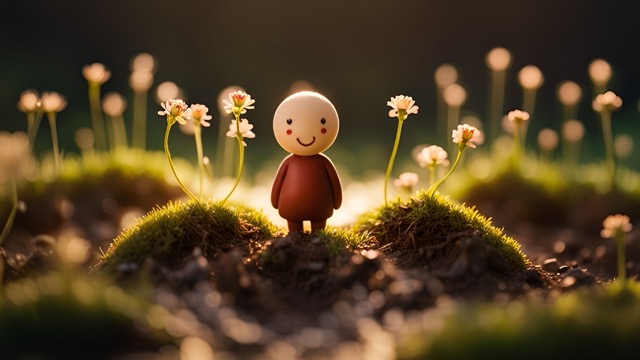Look at those smiling faces in the photos. Everyone is congratulating her. Why haven't I achieved something like this? Maybe I'm not as talented.... I've been stuck for years. What am I doing wrong? I should have applied for better opportunities. I should have gone back to school. Now, I'm just stuck in this dead-end. My life is passing me by, and I'm not making any progress.
| Living the dream in paradise. Everyday feels like a vacation!. |
|---|
 |
I wish my life could be as perfect. She's always traveling to incredible places and never seems to face any problems. My life feels so mundane compared to hers. I must be doing something wrong.
Today's post was inspired by a conversation I had with my son today while driving. The focus of the conversation was on social media engagement: how it initially had a pull effect, causing the user engage more, gradually the user realised that most of the engagements had a motivation - to gain more followers instead of genuine engagement. It was all about that number. Consequently, there were feelings of disappointment, sadness and a sense of emptiness as "followers" dropped after getting a follow. The user then found himself trying different posts and diversifying to regain the engagement, retain the followers, keep existing one... yet engagement dropped and eventually a sense of resentment took over.
Take a moment and recollect our own experiences. Social media in this article is merely the stage. The platform for this article to develop.
Rumination
Rumination aligns with the concept of "papanca" or "proliferation." It signifies the incessant and obsessive mental activity that dwells on thoughts, memories, or perceptions. This cognitive cycle amplifies suffering and perpetuates the illusion of a solid and enduring self.
It is the tendency to dwell on thoughts, replaying them in our minds repeatedly. It's that inner voice that replays past events, worries about the future, and continually compares our lives to others'. Rumination, can lead to increased stress, anxiety, and dissatisfaction.
The Seed
Social media platforms are designed to trigger attachment and craving. They present us with an array of idealized images and curated lifestyles, often prompting us to form attachments to these digital representations. As we engage with these images, we may find ourselves yearning for the possessions, experiences, or attributes showcased in posts. This attachment can become a breeding ground for rumination.
Consider the pursuit of "likes" and positive feedback on social media. Every time we post a photo or status update, do we hope for validation in the form of likes, comments, and shares? This craving for external validation can lead to a perpetual cycle of desire, seeking validation as we repeatedly evaluate our self-worth based on the feedback we receive (in this case, feedback can be negative, or simply none).
Mental factors play an important role in shaping our thoughts, emotions and overal mental experience. They accompany and influence our primary mental states. Some key mental factors involved in rumination and emotions are as follows.
- joy,
- sadness, or
- initial thoughts
Mental Formations are volitional activities. They are the mental forces that underlie our intentions, choices and action. In the context of rumination, these facrors of formations highlight the role of volition in shaping our mental states.
For example
When we repeatedly ruminate on a negative comment received on social media, it is driven by the volitional activity of the mind.
Often, we are unaware. Or if we are aware, we have difficulty braking the mechanism. As a result, our mental faculties are taxed, and we undergo great suffering as we struggle to put an end to it, and we struggle at not being able to do so.
The resultant: double suffering: extreme mental anguish.
Sankharas underscore the idea that our thoughts and emotions are not passive experiences but are influenced by our volitional choices.
The first thing we need to do is stop, and return to our breathing, but not forcefully. It is here that we first need to embrace ourselves and recognise the great pain that we are in. When we can truly embrace and be kind to ourself, we will be able to feel a sense of relief. This relief, is the beginning.
It is important to note here that - this has nothing to do with whether you are weak or strong. It is not that at all. In fact, don't further torture yourself. Allowing your own tears to fall is not a sign of weakness. It is self healing. Your body, your emotions, your entire self needs you most at this time.
Take care of yourself.
| Be Present for Yourself. |
|---|
 |
A common technique that I often hear, is that we should "reward" ourselves with something to "make us feel better". I can't say much about this - I don't know to what extent this will help. But, external or material reward in my opinion is not very good at replacing/substituting. But maybe you have a different experience.
From my experience, taking care of ourselves is to first be patient with ourselves and be present for ourselves. It is important at this point to note whether we are suppressing ourselves or not.
We must first come home to our inner refuge.
Can I do that?
In the course of my life, I have gradually learnt why it is important to care.
Care for oneself, Care for others and allow ourselves to be cared for.
Why?
Because we are worthy.
So the question then, what seed are we cultivating?
| Cutivate the Right Seed. |
|---|
 |
| Cultivate those seeds that you want it to become a reality |
Note: Rumination is often hypothesised to be linked to impaired emotional regulation. I opine that it is more important to look at developing the capacity for emotional regulation. And for that, it is imperative that one look at the root and by root I do not mean the external manifestations but rather, one's inner mechanisms.
Update:
Part 2 of this article is available here